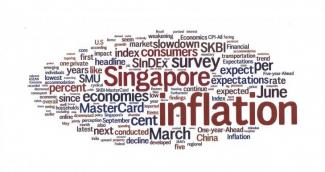
[Singapore, 20 October 2014 (Monday)] – The one-year-ahead inflation expectations of Singapore households has inched up to 3.73%, according to the research findings of the latest quarterly survey for Singapore Index of Inflation Expectations (SInDEx) by Singapore Management University (SMU). This is the first rise both for headline rate (or CPI-All Item) and the Singapore core inflation rate (excluding accommodation and private transportation expenses) expectations since September 2012 mainly due to domestic pass-through price pressures.
In Singapore, pass-through costs like rental and tight labour market conditions have continued to put an upward pressure on prices. Lower imported inflation, including lower oil prices, seems not to have substantive downward impact on reducing the perceptions of future inflation expectations.
Significant global economic and geopolitical uncertainty persists even as the US Federal Reserve wound down the unprecedented stimulus in Quantitative Easing (or QE 3). In fact, the relative success of the QE programme in reducing the unemployment rate in the US to a pre-crisis level have prompted the other G3 economies (Eurozone and Japan) to emulate similar stimulus plans. However, multiple challenges remain, such as the US labour force participation rate at a 30-year low, a possibility of seemingly mild triple dip recession in Eurozone, and weakening growth in some major emerging economies which dampens the pace of global recovery. The warning of slowing global growth in the IMF World Economic Outlook report released in October 2014, as a result of which the US Federal Reserve Board may push back the rate hike might have prolonged the availability of liquidity in the near term.
The SInDEx, which was originally developed by SMU’s Sim Kee Boon Institute for Financial Economics (SKBI) in collaboration with MasterCard International, is derived from an online survey of around 500 randomly selected individuals representing a cross section of Singapore households.
The online survey helps researchers understand the behaviour and sentiments of decision makers in Singapore households. This quarterly SInDEx survey, started in September 2011, has yielded two indices that were officially launched in January 2012. SMU Assistant Professor Aurobindo Ghosh and Professor Jun Yu are the co-developers of the SInDEx.
In the latest survey conducted in September 2014, consumers shared their views on expectations of inflation-related variables over the medium term (One-year-Ahead) to long term (Five-year-Ahead).
The results of the September 2014 wave of the SInDEx survey showed that compared to June 2014, the One-year-Ahead headline inflation (or CPI-All Item inflation) has inched up to 3.73% from 3.66% in June 2014, its first rise in nearly two years since September 2012.
Compared to the historical average of 4.16% and the second quarter average of 3.79%, the current One-year-Ahead headline inflation expectations shows that Singapore households are a little wary of possible price increases on essential items due to pass-through costs despite significant drop in current inflation rates.
Following the overall headline inflation, the One-year-Ahead Singapore core inflation expectations (excluding accommodation and private transportation related costs) also edged up to 3.95% in September 2014 (from 3.85% in June 2014), reflecting an apparent end to the downward trend since September 2012. For a subgroup of the population who own their accommodation and use public transport, the One-year-Ahead Singapore core inflation rate was 3.83% in the September 2014 survey compared to 3.81% in June 2014. These respondents in reality face the Singapore core inflation as they don’t have to face changes on accommodation or private transportation costs directly.
One-year-Ahead Singapore Index of Inflation Expectations (SInDEx1), a composite weighted index of One-year-Ahead inflation expectations, maintained an overall downward trend to 3.84%, continuing its sub 4% value since June 2013, and lower than its historical average of 4.2%. SInDEx1 puts lower weightage on more volatile components like accommodation, private transportation, food and energy expenses, hence it is expected to be more stable than the all-inclusive headline inflation expectations.
SMU Assistant Professor Aurobindo Ghosh, co-creator and Principal Investigator of the SInDEx Project at SKBI said, “After the completion of US FED’s bond buying (or QE3), financial markets are rife with expectations of an impending interest rate hike. However, the slowing world economy, as IMF World Economic Outlook has highlighted last week, is putting a damper on the timing of such a rate increase next year. US FED Board’s vice chairman Stanley Fischer and others have opined slowing world growth, coupled with a strong US dollar and consequent lower imported inflation, might prompt the FED to postpone its rollback of accommodative policy or interest rate hike.”
“Recent moderation in accommodation prices and private car prices in Singapore, together with subdued global and regional economic conditions, seem to have brought down the current CPI-All inflation rates to very low levels. However, the Monetary Authority of Singapore recently projected that there might be an upward pressure on the Singapore core inflation, possibly from the tight labour market and other pass-through costs. The elevated inflation expectations, including the headline inflation rate, is likely due to behavioural biases in survey based data which might cause respondents to over emphasise price rise in everyday items, while ignoring big ticket items,” Prof. Ghosh added.
For the longer horizon, the Five-year-Ahead overall (CPI-All Items) inflation expectations in the September 2014 survey stood flat at 4.72% (unchanged since December 2013). This is the lowest since inception, maintaining a slowing trend of decline since September 2012. The Five-year-Ahead Singapore core inflation rate (excluding accommodation and private road transportation related costs) inched down to 4.45% from 4.5% in the June 2014 wave.
The composite Five-year-Ahead Singapore Index of Inflation Expectations (SInDEx5) in September 2014 edged up to 4.57% from 4.51% in June 2014, still significantly lower than the historic average SInDEx5’s of 4.88%. Without any other benchmark, this composite index probably signals some discomfort among the respondents on the long running impact on purchasing power or real interest rate.
For more information, please contact
Teo Chang Ching (Mr)
Assistant Director
Corporate Communications
DID: 6828 0451
Email: ccteo [at] smu.edu.sg